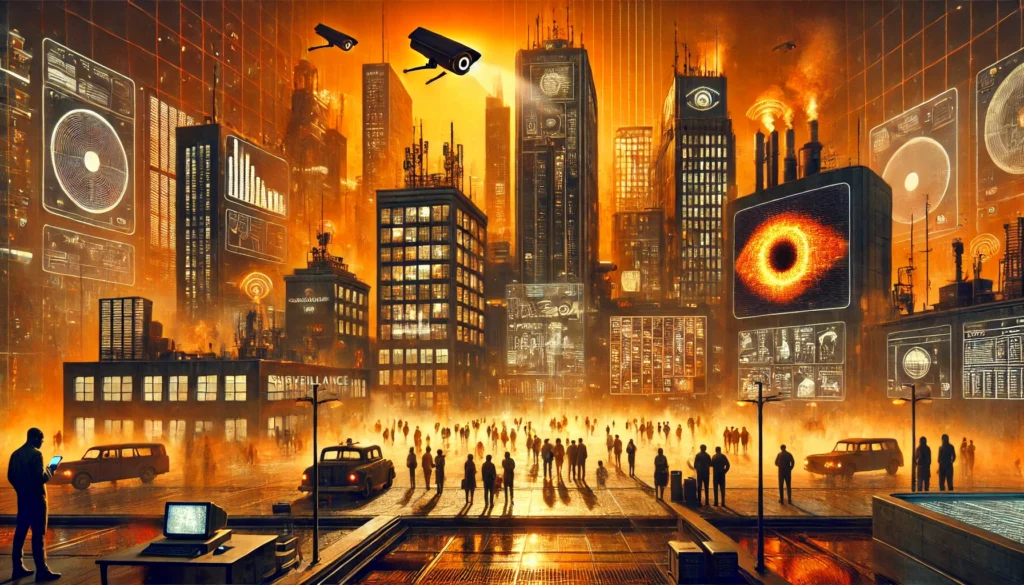
BY: Tom Groth and GPT-4o
Expanding on the concerns you’ve raised about content moderation and its implications for freedom of speech, let’s delve deeper into the dystopian implications and draw parallels to the works of Philip K. Dick, such as “Electric Dreams,” “Paycheck,” “Minority Report,” and “A Scanner Darkly.”
Dystopian Concerns in the Digital Age
As technology advances, the power to control, manipulate, and surveil public discourse grows, raising significant concerns about the future of free speech, privacy, and autonomy. The increasing reliance on artificial intelligence for content moderation, decision-making, and even predictive policing echoes many of the dystopian themes explored in Philip K. Dick’s works, where technology often becomes a tool for control and oppression, rather than liberation.
1. Surveillance and Predictive Policing: Parallels to “Minority Report”
In “Minority Report,” Dick envisions a world where a specialized police force, aided by psychics known as “precogs,” arrests individuals for crimes they have not yet committed but are predicted to commit in the future. This concept of “pre-crime” raises significant ethical concerns about free will, privacy, and the justice system.
Drawing parallels to our current digital landscape, AI and big data are increasingly used to predict behavior and assess risk, from credit scores to law enforcement tactics. Predictive algorithms are used to identify potential criminals or monitor individuals deemed high-risk, effectively creating a form of “digital pre-crime.” This technology’s reliance on historical data and patterns can reinforce biases and lead to discriminatory practices, as individuals are judged not by their actions but by data points and probabilities.
Furthermore, constant surveillance through social media, smartphone tracking, and smart home devices mirrors the omnipresent surveillance in “Minority Report.” Individuals are monitored continuously, and their behaviors are analyzed, creating a society where privacy is a luxury rather than a right.
2. Control Over Information: Echoes of “A Scanner Darkly”
In “A Scanner Darkly,” Dick explores themes of surveillance, identity, and the erosion of privacy in a world where the boundaries between the watcher and the watched blur. The protagonist is both a drug addict under surveillance and a government agent, losing his sense of identity as he becomes consumed by the system.
Today, the lines between public and private life are increasingly blurred. Companies and governments can monitor individuals’ online activities, and algorithms decide what content is seen or suppressed. This control over information can create echo chambers, where individuals are only exposed to certain viewpoints, reinforcing biases and limiting free thought.
Moreover, as in “A Scanner Darkly,” there is a risk that individuals may lose their sense of identity and autonomy as they become more entangled in digital systems designed to monitor and manipulate behavior. This erosion of personal freedom and agency raises fundamental questions about what it means to be human in a world where technology has such pervasive control over our lives.
3. Corporate Control and Loss of Autonomy: Insights from “Paycheck”
“Paycheck” explores themes of corporate control, memory manipulation, and loss of autonomy. The protagonist, Michael Jennings, works on a secret project for a company that erases his memory upon completion. This story reflects concerns about corporate power, where individuals are valued only for their utility to the corporation and are easily discarded once their usefulness is over.
In our current era, corporations increasingly influence public discourse through control over digital platforms. The concentration of power in a few tech giants’ hands means they have significant control over what information is disseminated and which voices are amplified or silenced. This dynamic raises concerns about the erosion of democratic principles, as these entities are not accountable to the public in the same way that governments are.
Furthermore, the use of AI to curate content, moderate speech, and even shape public opinion can be seen as a form of soft manipulation, where individuals’ choices and perceptions are subtly influenced by unseen forces. This loss of autonomy, where decisions are increasingly made for us by algorithms, parallels the memory erasure in “Paycheck,” where individuals lose control over their narratives.
4. Reality and Illusion: Themes from “Electric Dreams”
“Electric Dreams” and other works by Philip K. Dick frequently explore the blurred line between reality and illusion, questioning what is real and what is fabricated. In today’s digital world, deepfakes, AI-generated content, and misinformation campaigns challenge our ability to discern truth from falsehood. The creation of digital realities and echo chambers can manipulate public perception and create a distorted view of reality, echoing Dick’s concerns about the fragility of reality and the ease with which it can be manipulated.
This theme raises profound questions about trust, truth, and the nature of reality in a world where technology can create convincing illusions. As our reliance on digital information grows, so does the potential for reality to be shaped and controlled by those who wield technological power, leading to a society where truth is subjective and manipulable.
Conclusion
The themes explored in Philip K. Dick’s works resonate strongly in our current technological landscape. The potential for surveillance, loss of autonomy, corporate control, and the manipulation of reality present significant dystopian concerns that require careful consideration. As we navigate this digital age, it is crucial to remain vigilant about the ethical implications of technology and strive to protect the fundamental rights and freedoms that define a democratic society. The future of free speech, privacy, and autonomy depends on our ability to balance technological advancement with the preservation of human dignity and liberty.